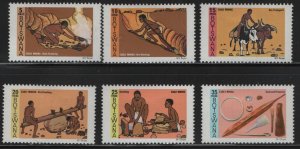Discovering Botswana: Culture, Economy, and Nature

Introduction
Botswana, a landlocked country in southern Africa, is gaining significant attention for its remarkable blend of rich culture, robust economy, and incredible wildlife. Known for its stable democratic governance and progressive policies, Botswana offers a unique case study in African development, highlighting the potential that exists on the continent today. With an increased global focus on sustainable tourism and conservation, understanding Botswana’s dynamics is more important than ever.
The Cultural Tapestry
Botswana is home to a diverse array of ethnic groups, predominantly the Tswana people, who have a rich cultural heritage comprising music, dance, and traditional festivals. The country’s capital, Gaborone, is a vibrant city where modernity meets tradition, offering visitors a glimpse into the evolving social fabric. Cultural events like the Botswana Cultural Festival showcase local art forms, culinary traditions, and traditional storytelling, making it a significant platform for expressing and preserving the nation’s cultural identity.
Economic Growth and Stability
Since gaining independence from Britain in 1966, Botswana has transformed itself from one of the poorest countries in the world to a middle-income nation, primarily as a result of its diamond-rich resources and prudent economic management. According to the World Bank, Botswana’s GDP growth rate has consistently outpaced that of many African nations. Efforts are being made to diversify the economy by investing in sectors such as tourism, manufacturing, and agriculture. The country has also established a conducive environment for foreign investment, reflecting its commitment to economic resilience.
Natural Wonders
Botswana is renowned for its stunning landscapes, particularly the Okavango Delta, a UNESCO World Heritage site known for its unique ecosystem and biodiversity. The delta draws tourists worldwide, offering safari experiences that are unparalleled. Wildlife conservation is a key focus for the government, which has implemented substantial measures to protect endangered species, including elephants and rhinos, promoting ecotourism as a sustainable way to engage with nature while supporting local communities.
Conclusion
In conclusion, Botswana stands as a beacon of hope and opportunity in Africa. With its rich cultural heritage, robust economic framework, and breathtaking natural landscapes, the nation is well-positioned for continued growth and development. As we look towards the future, Botswana’s ability to balance economic gains with environmental preservation and cultural integrity will be essential. For readers interested in travel, investment, or cultural understanding, Botswana offers a multitude of opportunities that deserve exploration.









